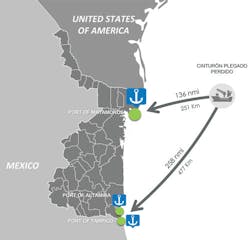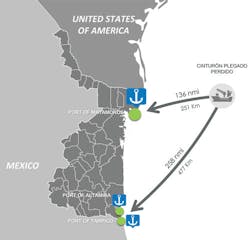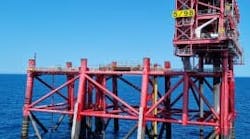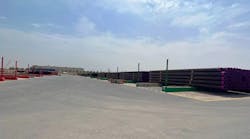The offshore oil and gas industry in theUS Gulf of Mexico is likely breathing a sigh of relief in the wake of a decision by the US Customs and Border Protection (CBP) Agency to withdraw a previously announced plan to end exemptions to the Jones Act. The original legislation, passed in 1920, mandates that cargo-carrying vessels traveling between US ports must fly US flags and be staffed by US crews.
The more recent CBP proposal would have reversed exemptions to certain types of vessels that move equipment. Made in the final days of the Obama administration, the CBP proposal was immediately met with a backlash from the oil and gas industry, with a chief complaint being that there would be an inadequate supply of US-flagged vessels to meet the current needs.
Groups including the API and International Marine Contractors Association (IMCA) issued reports in April detailing the possible negative effects of the changes.
Supporters of the CBP’s proposal, such as the American Maritime Partnership, the Shipbuilders Council of America, the Offshore Marine Service Association, and certain lawmakers in Washington, said that the modifications would close loopholes and restore American jobs.
Critics of the CBP proposal said that the changes could have unintended consequences and may prevent foreign-flagged deepwater construction vessels from operating in the Gulf of Mexico, where there is a need for highly specialized vessels. A recent report by the IMCA concluded that the US coastwise qualified fleet is unable, on its own, to support activities in the US offshore deepwater market.
“The specialist deepwater offshore vessels are operated by international marine contractors based in the United States,” said the IMCA report. “These are companies who employ thousands of US citizens offshore and onshore in high-value, high-skilled jobs and have contributed significantly to the US economy and their local communities for decades. These international companies have invested heavily in fabrication yards, and engineering, design and management capacity, providing thousands of jobs for American workers.”
API Upstream Director Erik Milito commented that the CBP proposal “could have resulted in the loss of thousands of American jobs, reduced US oil and natural gas production, and diminished revenues for federal and state government.”
The API’s analysis found the proposal would cause workforce reductions “in the range of 30,000 industry supported jobs in 2017, with as many as 125,000 jobs lost by 2030,” with the Gulf of Mexico states standing to be the most impacted, as well as a decrease in US oil and natural gas production in the range of 23% from 2017-2030.
“By rescinding the proposal, CBP has decided not to impose potentially serious limitations to the industry’s ability to safely, effectively, and economically operate,” Milito added.
Allen Leatt, chief executive of IMCA, also expressed that the group welcomed the decision. “Members of the International Marine Contractors Association with vessels active in US waters, together with their clients, welcome the decision by the CBP Agency to withdraw its proposed revocation of longstanding decisions made over the last 40 years concerning the Jones Act. The proposals, which would have represented a major change in maritime policy if enacted, had been forecast to result in a substantial GDP loss coupled with significant American job losses along the entire US Gulf coast.
“Now that the CBP proposal has been withdrawn,” Leatt added, “IMCA and its members, look forward to working with CBP and other regulatory and industry stakeholders to consider ways to conduct complex operations offshore under the Jones Act. This development will greatly assist in providing operators and international contractors the confidence they need to continue investing in the Gulf of Mexico, and continuing to create American jobs and prosperity.”
Common safety framework needed, says OPITO
Safety, standards, and workforce development organization OPITO has called for the US oil and gas market to embrace common industry standards, in order to strengthen the safety culture in the Gulf of Mexico.
During a technical session at OTC 2017 on approaches to improving health, safety, and environment performance, OPITO officials highlighted the need for its international offshore emergency response framework to be implemented in the region.
This would ensure, the officials argued, that personnel are equipped to react in the same way when life threatening situations occur.
Albert Skiba, OPITO’s vice president Gulf of Mexico, and approvals manager Richard Edwards said that on average, 80% of accidents in the offshore oil and gas sector were down to human error.
Since the downturn, and its attendant 350,000 job losses, the oil and gas industry globally had become more diverse, they added, bringing a need for greater consistency in workforce safety.
According to Skiba, “In a post-Macondo world, the Gulf of Mexico has been vigilant in developing programs to improve the safety of the drilling and completion process but it has not applied the same due diligence to implementing common standards to keep its workers safe and competent. Employers need to provide clarity so personnel know what is expected from them when operating across borders and in partnership with other organizations.”
Despite the GoM being amongst the most developed offshore regions in the world, he added, “it is yet to take up the OPITO framework which has been widely adopted by 45 oil and gas producing regions internationally. As an industry, we have to be proactive rather than reactive to incidents and head any off potential problems at the pass. A pan-industry approach is the only way to ensure this is addressed so employees know exactly what to do and all react in the same way when an incident occurs.”







